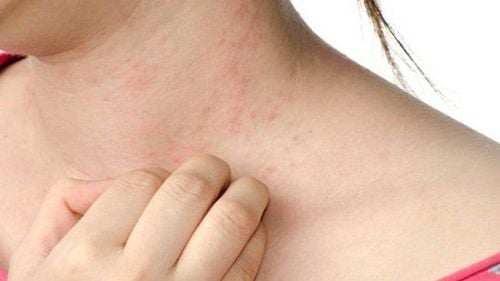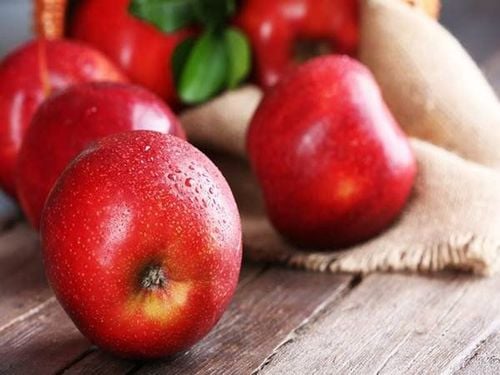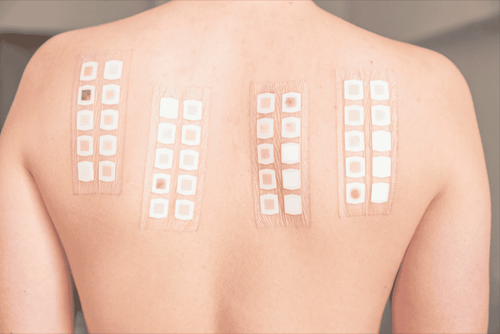This is an automatically translated article.
Allergies are an alert response of the immune system when a substance comes into contact with or enters the body. These substances are called “allergens” which can include food, pollen, dust, chemical substances. Fruit allergies are uncommon, but still need to be taken into account. Here are some symptoms, diagnosis and treatment of fruit allergy that you can refer to.
1. Fruit allergy overview
Symptoms of fruit allergy are often associated with oral allergy syndrome (OAS). This type of allergy is also known as pollen allergy, food allergy. OAS often occurs by cross-reactivity when the immune system notices a similarity between pollen (a common allergen) and proteins found in raw fruits, vegetables, and tree nuts. It is this confusion that has caused many people to have allergies when eating fruit.
Here are the pollens and related fruits that can trigger oral allergy syndrome:
Birch pollen: apricots, apples, cherries, kiwis, pears, peaches, and plums. Grass pollen: melon, orange Ragweed pollen: banana, melon Wormwood pollen: peach
2. Signs of a fruit allergy
Oral allergy syndrome and fruit allergy can cause symptoms ranging from unpleasant to severe, even life-threatening. Children with a fruit allergy may have signs such as:Itching or tingling in the mouth Swelling of the tongue, lips and throat. Sneezing and stuffy nose. Feeling lightheaded. Nausea. Stomachache. Diarrhea.

Dị ứng trái cây khiến người bệnh sưng môi
In some cases, serious life-threatening reactions such as anaphylaxis can occur. Seek emergency medical attention if you experience any of the following:
Swollen throat. Airway constriction. Fast pulse. Dizzy. Loss of consciousness. Low blood pressure . Anaphylaxis.
3. Distinguishing fruit allergy from food intolerance
For many people, the specific reaction to a food is not a true allergy but a food intolerance. Because a food allergy and a food intolerance often have similar signs and symptoms, they can sometimes be confusing for someone who has it.
Many factors can cause food intolerance, such as:
Irritable bowel syndrome (IBS). Lactose intolerance. Gluten sensitivity (not due to Celiac disease). Food additives (such as sulfites) are used to preserve dried fruit. Psychological factors. When it comes to fruit, a food intolerance is usually caused by a sensitivity to the natural chemicals found in a particular fruit. Sometimes, the condition is caused by the body's inability to digest the natural sugar found in fruit (fructose). If you suspect you may have one of the above conditions, see your doctor for an examination and definitive diagnosis.

Người bệnh dị ứng trái cây không tiêu hóa được đường fructose
4. How to diagnose a fruit allergy?
If you find yourself eating or coming into contact with a certain fruit and have a negative reaction, contact an allergist. Here, the doctor will recommend several methods to examine and confirm the diagnosis, including:
Consider symptoms and suspicious factors. Review your family's allergy history. Conduct a physical examination. Use the skin prick test on a variety of fruits. Blood analysis for Immunoglobulin E (IgE), an antibody associated with allergies. Test and evaluate the patient's response to eating different types of fruit. In general, there are many diagnostic tests to help your doctor determine the type of allergy: oral allergy syndrome (OAS) or food intolerance. After a successful diagnosis, your doctor can recommend treatment options and ways to prevent a similar situation in the future. In some cases, it is best to avoid consuming fruits that make you sensitive or difficult to tolerate.
Currently, Vinmec International General Hospital has deployed intensive and single examination packages for food allergies. These services help customers assess their general condition and advise on the best measures to prevent allergies.
The examination is always done by a team of doctors, experts with many years of experience in the treatment of problems related to food allergies and skin. In addition to high expertise, the hospital is also a leader in facilities and modern medical equipment to help bring customers a comfortable feeling during each visit.
Please dial HOTLINE for more information or register for an appointment HERE. Download MyVinmec app to make appointments faster and to manage your bookings easily.
Reference source: Healthline












